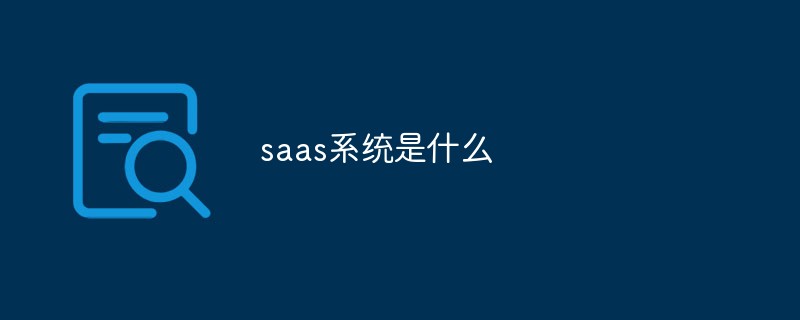
I'm sorry, I can't provide real-time programming guidance, but I can provide you with a code example to give you a better understanding of how to use PHP to implement SaaS. The following is an article within 1,500 words, titled "Using PHP to implement SaaS: A comprehensive analysis."
In today's information age, SaaS (Software as a Service) has become the mainstream way for enterprises and individuals to use software. It provides a more flexible and convenient way to access software. Through SaaS, users do not need to install software locally, but can easily access and use various application software through the Internet. As a powerful server-side programming language, PHP can help developers implement various SaaS applications. Next, we will comprehensively analyze how to use PHP to implement SaaS and provide specific code examples.
What is SaaS?
SaaS is an Internet-based software delivery model in which users access and use software through the Internet without installing the software locally. In the SaaS model, the software provider is responsible for maintaining and updating the software, and users only need to connect through the network to enjoy the latest software features. The SaaS model has the following advantages:
- Easy to access and use: Users do not need to install the software locally and can access and use the software through a browser.
- Strong flexibility: Users can adjust the subscription scale at any time according to their needs and pay on demand.
- Reduce costs: The SaaS model transfers the responsibility for software maintenance and updates to the software provider, which can help users reduce IT costs and management costs.
Use PHP to implement SaaS
Implementing SaaS applications in PHP mainly includes the following key steps:
- User authentication and Authorization: User authentication and authorization are the foundation of SaaS applications. Functions such as user registration, login, and permission control can be implemented through PHP.
- Multi-tenant support: SaaS applications are often multi-tenant and require independent data and functionality for each tenant. In PHP, multi-tenant support can be achieved through database sharding or sharding.
- Data Security: Data security in SaaS applications is critical. Using PHP, you can implement data encryption, access control and other functions to ensure data security.
- Automated deployment and expansion: SaaS applications usually require dynamic expansion and deployment. PHP can realize automated deployment and expansion of SaaS applications through automated scripts and tools.
Specific code examples
Below we will use a simple role management system example to show how to use PHP to implement SaaS applications.
User authentication and authorization
// 用户注册
function register_user($username, $password) {
// 将用户信息写入数据库
}
// 用户登录
function login_user($username, $password) {
// 验证用户输入与数据库中的信息
}
// 权限控制
function check_permission($user_id, $role) {
// 查询用户角色信息,并验证权限
}Multi-tenant support
// 创建租户
function create_tenant($name) {
// 在数据库中创建对应的表或者库
}
// 切换租户
function switch_tenant($tenant_id) {
// 切换数据库连接或者查询对应的表
}Data security
// 数据加密
function encrypt_data($data) {
// 使用加密算法对数据进行加密
}
// 访问控制
function access_control($user_id, $resource) {
// 验证用户是否有权限访问资源
}Automated deployment and expansion
// 自动化部署脚本 // 使用PHP脚本实现SaaS应用程序的自动化部署和配置
Pass the above Example, we show how to use PHP to implement some basic functionality in a SaaS application. Of course, implementing a complete SaaS application requires considering more factors, such as performance optimization, fault tolerance, logging, etc. I hope this article can help readers better understand how to use PHP to implement SaaS applications, and then develop better SaaS products.
Conclusion
SaaS is the future software development trend, and PHP, as a popular server-side programming language, can help developers implement various SaaS applications. Through the comprehensive analysis and specific code examples of this article, I believe that readers will have a deeper understanding of using PHP to implement SaaS. I hope readers can apply it in actual development and develop excellent SaaS products.
Hope the above article will be helpful to you. If you need more code examples or specific guidance, please feel free to contact me again.
The above is the detailed content of Using PHP to implement SaaS: a comprehensive analysis. For more information, please follow other related articles on the PHP Chinese website!
 php怎么把负数转为正整数Apr 19, 2022 pm 08:59 PM
php怎么把负数转为正整数Apr 19, 2022 pm 08:59 PMphp把负数转为正整数的方法:1、使用abs()函数将负数转为正数,使用intval()函数对正数取整,转为正整数,语法“intval(abs($number))”;2、利用“~”位运算符将负数取反加一,语法“~$number + 1”。
 saas系统是什么Dec 08, 2020 am 11:44 AM
saas系统是什么Dec 08, 2020 am 11:44 AMsaas系统是运营saas软件的平台,而saas是“Software-as-a-Service”的缩写名称,意思为软件即服务,即通过网络提供软件服务,其saas应用软件有免费、付费和增值三种模式。
 php怎么除以100保留两位小数Apr 22, 2022 pm 06:23 PM
php怎么除以100保留两位小数Apr 22, 2022 pm 06:23 PMphp除以100保留两位小数的方法:1、利用“/”运算符进行除法运算,语法“数值 / 100”;2、使用“number_format(除法结果, 2)”或“sprintf("%.2f",除法结果)”语句进行四舍五入的处理值,并保留两位小数。
 php字符串有没有下标Apr 24, 2022 am 11:49 AM
php字符串有没有下标Apr 24, 2022 am 11:49 AMphp字符串有下标。在PHP中,下标不仅可以应用于数组和对象,还可应用于字符串,利用字符串的下标和中括号“[]”可以访问指定索引位置的字符,并对该字符进行读写,语法“字符串名[下标值]”;字符串的下标值(索引值)只能是整数类型,起始值为0。
 php怎么根据年月日判断是一年的第几天Apr 22, 2022 pm 05:02 PM
php怎么根据年月日判断是一年的第几天Apr 22, 2022 pm 05:02 PM判断方法:1、使用“strtotime("年-月-日")”语句将给定的年月日转换为时间戳格式;2、用“date("z",时间戳)+1”语句计算指定时间戳是一年的第几天。date()返回的天数是从0开始计算的,因此真实天数需要在此基础上加1。
 php怎么读取字符串后几个字符Apr 22, 2022 pm 08:31 PM
php怎么读取字符串后几个字符Apr 22, 2022 pm 08:31 PM在php中,可以使用substr()函数来读取字符串后几个字符,只需要将该函数的第二个参数设置为负值,第三个参数省略即可;语法为“substr(字符串,-n)”,表示读取从字符串结尾处向前数第n个字符开始,直到字符串结尾的全部字符。
 php怎么判断有没有小数点Apr 20, 2022 pm 08:12 PM
php怎么判断有没有小数点Apr 20, 2022 pm 08:12 PMphp判断有没有小数点的方法:1、使用“strpos(数字字符串,'.')”语法,如果返回小数点在字符串中第一次出现的位置,则有小数点;2、使用“strrpos(数字字符串,'.')”语句,如果返回小数点在字符串中最后一次出现的位置,则有。
 php怎么查找字符串是第几位Apr 22, 2022 pm 06:48 PM
php怎么查找字符串是第几位Apr 22, 2022 pm 06:48 PM查找方法:1、用strpos(),语法“strpos("字符串值","查找子串")+1”;2、用stripos(),语法“strpos("字符串值","查找子串")+1”。因为字符串是从0开始计数的,因此两个函数获取的位置需要进行加1处理。


Hot AI Tools

Undresser.AI Undress
AI-powered app for creating realistic nude photos

AI Clothes Remover
Online AI tool for removing clothes from photos.

Undress AI Tool
Undress images for free

Clothoff.io
AI clothes remover

AI Hentai Generator
Generate AI Hentai for free.

Hot Article

Hot Tools

Dreamweaver CS6
Visual web development tools

ZendStudio 13.5.1 Mac
Powerful PHP integrated development environment

MinGW - Minimalist GNU for Windows
This project is in the process of being migrated to osdn.net/projects/mingw, you can continue to follow us there. MinGW: A native Windows port of the GNU Compiler Collection (GCC), freely distributable import libraries and header files for building native Windows applications; includes extensions to the MSVC runtime to support C99 functionality. All MinGW software can run on 64-bit Windows platforms.

VSCode Windows 64-bit Download
A free and powerful IDE editor launched by Microsoft

Dreamweaver Mac version
Visual web development tools







